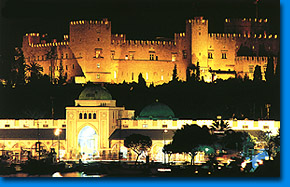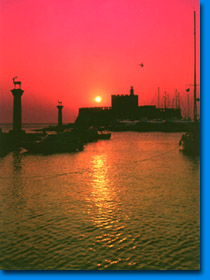 Rhodes,
one of the Mediterranean's most beautiful islands, lies in the southernmost part of the
Aegean Sea, very close to the shore of Asia Minor. The ancient Greeks were so taken with
its charms that they associated its beneficent climate with a myth that has lived on down
to our own times. According to this, Helios, the life-giving sun god, enchanted by the
island's natural beauty, asked Zeus as a favour that he should be its protector and
benefactor. Ever since then, Rhodes has been flooded with sunlight and the rays of its
favourite god have showered their gifts upon it. It would seem, though, that Rhodes has
been favoured by all the gods, since throughout its history it has known moments of
greatness and glory and emerged as one of the most important regions in the whole of
Greece. The cultures which have developed on its soil have each enriched it with their own
achievements and have left their mark upon it as one has succeeded the other. These marks
have remained indelible down to the present, giving the impression that every part of the
island is none other than a different plane in the mechanism of time. Next to the white
marble of the ancient temples and statues, the half-ruined walls of the settlements and
sanctuaries where the gods of ancient Greece were worshipped, stand the little Byzantine
churches with the gaze of the ecstatic fkioigures in their wall-paintings fixed on the
heavenly God of the Christians. with tourist shops, restaurants, cafes, bars and discos,
where music and dancing bring the night to life. In fact, Rhodes can grant any wish of the
holidaymaker. Rhodes,
one of the Mediterranean's most beautiful islands, lies in the southernmost part of the
Aegean Sea, very close to the shore of Asia Minor. The ancient Greeks were so taken with
its charms that they associated its beneficent climate with a myth that has lived on down
to our own times. According to this, Helios, the life-giving sun god, enchanted by the
island's natural beauty, asked Zeus as a favour that he should be its protector and
benefactor. Ever since then, Rhodes has been flooded with sunlight and the rays of its
favourite god have showered their gifts upon it. It would seem, though, that Rhodes has
been favoured by all the gods, since throughout its history it has known moments of
greatness and glory and emerged as one of the most important regions in the whole of
Greece. The cultures which have developed on its soil have each enriched it with their own
achievements and have left their mark upon it as one has succeeded the other. These marks
have remained indelible down to the present, giving the impression that every part of the
island is none other than a different plane in the mechanism of time. Next to the white
marble of the ancient temples and statues, the half-ruined walls of the settlements and
sanctuaries where the gods of ancient Greece were worshipped, stand the little Byzantine
churches with the gaze of the ecstatic fkioigures in their wall-paintings fixed on the
heavenly God of the Christians. with tourist shops, restaurants, cafes, bars and discos,
where music and dancing bring the night to life. In fact, Rhodes can grant any wish of the
holidaymaker. A little further on, the narrow street lead to medieval palaces and castles,
from which you expect to see knights in armour charge forth. At the same time, from behind
high walls the domed roofs of Turkish mosques and the crossed arches of the low houses in
the Turkish quarters make their presence felt. Nevertheless, all these images from the
past have not robbed Rhodes of the pleasures of modern life. On the contrary, they have
made a crucial contribution to the island's development, making it one of the most
cosmopolitan places in Europe. Thus the pace of its life has speeded up and it has become
a tourist centre of the greatest importance. Its harbours are full of ships, yachts and
fishing boats. Its beaches are covered with multicoloured sunshades and sun-tanned bodies.
Its hotels echo to the sound of every language under the sun. Its streets are filledThe
island's capital and Faliraki can provide a good time that will be long remembered. The
Old Town will enchant the romantic. The modern city will supply every need of the shopper.
The indented coastline with its beaches will provide a cooling swim in the hot afternoons,
and the parks, squares, and woods are ideal for quiet walks. At the same time, the
mountain villages will give visitors some idea of local tradition and allow them to
breathe the scented air and the aromas of tasty country cooking. At the local festivals,
which are frequent, the visitor can enter into the rhythms of Greek music and dance. And
those who want to learn about the history of Rhodes will find traces of it scattered
everywhere, from the settlement of Cameiros, the cemeteries of Ialysos and the imposing
rock of Lindos to the deserted monasteries, the churches of Filerimos, the forgotten
castle of Monolithos, the palaces and fortifications of the capital, and the Turkish baths
and mosques which bring the West closer to the Fast. However, whatever are the visitor's
wishes and expectations, no one can avoid feeling close by the shadow of the Colossus, the
bronze giant of Rhodes, its protector the Sun, who will be there to halt the flow of time
and link yesterday with today.
(c) 1999 RodosNet.
Designed by Spyros Spyropoulos |
|
 Images By : G. Grigoriou, Adam Editions, Marmatakis Btrothers Images By : G. Grigoriou, Adam Editions, Marmatakis Btrothers
|
|
 Rhodes,
one of the Mediterranean's most beautiful islands, lies in the southernmost part of the
Aegean Sea, very close to the shore of Asia Minor. The ancient Greeks were so taken with
its charms that they associated its beneficent climate with a myth that has lived on down
to our own times. According to this, Helios, the life-giving sun god, enchanted by the
island's natural beauty, asked Zeus as a favour that he should be its protector and
benefactor. Ever since then, Rhodes has been flooded with sunlight and the rays of its
favourite god have showered their gifts upon it. It would seem, though, that Rhodes has
been favoured by all the gods, since throughout its history it has known moments of
greatness and glory and emerged as one of the most important regions in the whole of
Greece. The cultures which have developed on its soil have each enriched it with their own
achievements and have left their mark upon it as one has succeeded the other. These marks
have remained indelible down to the present, giving the impression that every part of the
island is none other than a different plane in the mechanism of time. Next to the white
marble of the ancient temples and statues, the half-ruined walls of the settlements and
sanctuaries where the gods of ancient Greece were worshipped, stand the little Byzantine
churches with the gaze of the ecstatic fkioigures in their wall-paintings fixed on the
heavenly God of the Christians. with tourist shops, restaurants, cafes, bars and discos,
where music and dancing bring the night to life. In fact, Rhodes can grant any wish of the
holidaymaker.
Rhodes,
one of the Mediterranean's most beautiful islands, lies in the southernmost part of the
Aegean Sea, very close to the shore of Asia Minor. The ancient Greeks were so taken with
its charms that they associated its beneficent climate with a myth that has lived on down
to our own times. According to this, Helios, the life-giving sun god, enchanted by the
island's natural beauty, asked Zeus as a favour that he should be its protector and
benefactor. Ever since then, Rhodes has been flooded with sunlight and the rays of its
favourite god have showered their gifts upon it. It would seem, though, that Rhodes has
been favoured by all the gods, since throughout its history it has known moments of
greatness and glory and emerged as one of the most important regions in the whole of
Greece. The cultures which have developed on its soil have each enriched it with their own
achievements and have left their mark upon it as one has succeeded the other. These marks
have remained indelible down to the present, giving the impression that every part of the
island is none other than a different plane in the mechanism of time. Next to the white
marble of the ancient temples and statues, the half-ruined walls of the settlements and
sanctuaries where the gods of ancient Greece were worshipped, stand the little Byzantine
churches with the gaze of the ecstatic fkioigures in their wall-paintings fixed on the
heavenly God of the Christians. with tourist shops, restaurants, cafes, bars and discos,
where music and dancing bring the night to life. In fact, Rhodes can grant any wish of the
holidaymaker.